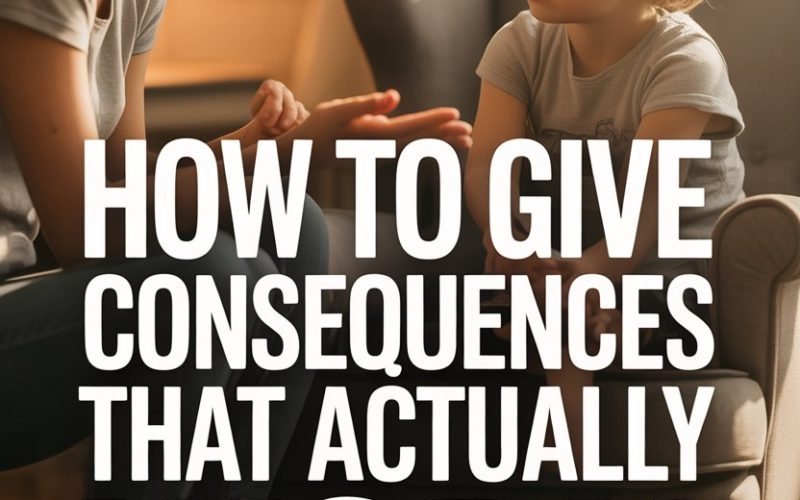Ah, consequences. A word that strikes fear into children and, let’s be honest, sometimes confusion into the hearts of parents everywhere.
If you’ve ever issued a consequence that mysteriously backfired (or was met with Oscar-worthy melodrama), you’re not alone.
Kids have a knack for turning “no screens for an hour” into a soliloquy on injustice that could win a BAFTA.
Still, consequences are the backbone of discipline.
When done right, they don’t just curb unwanted behaviour—they teach, guide, and help your child flourish into a half-decent roommate someday.
The trick is making them work, especially when your own to-do list is taller than your toddler.
Consequences Versus Punishments: Why It Matters
Consequences and punishments are about as different as broccoli and gummy bears. Both get the job done if you’re desperate, but only one is actually nourishing.
Punishments tend to be reactive and often come from a place of frustration. They might get your child to stop in the moment, but they rarely teach anything except, “Mum or Dad is having a day.”
Consequences, on the other hand, are linked to the child’s action and are meant to teach responsibility.
Say your child draws a mural (in permanent marker) on the living room wall.
A punishment might be sending them to their room. A meaningful consequence? Having them help scrub the wall or at least call in the professional cleaners while you both Google “washable paint” together.
Children learn best when the result makes sense. Keep consequences logical and connected—your future self will thank you.
The Magic of Consistency
If consequences were skincare, consistency would be SPF 50: absolutely essential.
When rules and follow-through are as variable as the British summer, kids are confused and, frankly, you’ll spend your evenings negotiating like a G7 diplomat.
Research continually shows consistent discipline helps children feel secure and understand expectations. If the rule is “jumping off the sofa means no TV for the evening,” enforce it every time, not just when you’re not on a work call.
Consistency doesn’t mean military precision or never changing your mind—life happens. But as much as possible, create predictable cause and effect.
Natural Consequences: The Universe Does Some Lifting
Natural consequences are those outcomes that happen without any interference from you.
Forget to bring your jumper on a chilly morning? They’ll be cold. Refuse to eat dinner? Hunger might just strike before bed.
There’s genius in letting the world teach a lesson.
As long as the risk isn’t safety-related (no, you cannot let them “learn” about traffic), allowing a child to feel the result of their choice makes your job easier and the lesson stickier.
Try to stay neutral and avoid the “I told you so” dance. Even if the urge is strong.
Logical Consequences: Connecting the Dots
Natural consequences are great, but sometimes you need to step in.
Logical consequences are linked clearly to the behaviour and make sense to the child. Think: “If you throw your toy, you lose your toy for the afternoon.” Not: “You threw your toy, now you lose dessert and can’t go to your mate’s party.”
Kids aren’t always logical beings, but logical consequences help them see cause and effect. The aim is to teach, not punish.
If you can explain the consequence in a single sentence without sounding like you’re reciting legal code, you’re on the right track.
Timing Is Everything
Deliver consequences as close to the behaviour as possible. Waiting hours (or bringing up something from last Christmas) only dilutes the lesson.
Children, especially little ones, live in the moment.
A consequence delivered immediately is more likely to be connected to the action in their mind. Think of it as “catching them in the act”—ideally, without looking too gleeful about it.
If you’re upset and need a breather yourself, say, “I need a moment to think about this.”
It’s okay for kids to see adults managing their own emotions. Then, circle back to the consequence while the event is still fresh.
Short and Sweet, Not Long and Drawn-Out
A four-week ban from the iPad? Unless you’re a superhero with nerves of steel, you’re punishing yourself too.
Effective consequences are short but meaningful. Enough to be felt, not so long that everyone forgets what they were for.
A young child might need a five-minute break from a game. An older child might lose phone privileges for the evening.
The goal is to give just enough sting to get their attention (without you needing a spreadsheet to track when privileges can be returned).
Be Calm, Not Catastrophic
Delivering consequences while channeling your inner soap opera star (complete with trembling hands and raised voice) will only escalate the situation. Children respond best when adults are calm and in control.
Even if you’re fuming that your child painted the dog with yoghurt again, aim for a neutral tone. “You painted the dog, so the paints are away for today.” Then, quietly contemplate where it all went wrong.
If you do lose your temper, don’t panic. Apologize and explain that everyone makes mistakes—including grownups.
Modelling good emotional regulation is half the battle won.
Choices, Not Dictatorship
When children feel they have some control, they’re more likely to cooperate. Offer choices within limits: “You can tidy your blocks now and keep playing, or leave them out and lose them for tomorrow.”
This approach, sometimes called authoritative parenting, balances boundaries with respect. Kids get some say, but you’re not handing over the keys to the kingdom.
Just don’t offer choices you can’t really follow through on. “Do you want to do your maths workbook or clean the gutters?” isn’t fooling anyone.
Praise the Comeback, Not Just the Crime
When a consequence is followed and your child makes amends, celebrate it. Not with a parade and cupcakes (tempting, but unsustainable), but with genuine praise.
“Thanks for sorting out your mess so quickly, I really appreciate it.” A little positive feedback goes a long way.
Children who only hear criticism start to tune out, so catch them being good, too.
You’re not bribing, you’re reinforcing the behaviour you want to see.
And if you need to, reward yourself with an extra biscuit. You’ve earned it.
Pick Your Battles
Some days, socks on hands at the dinner table just isn’t worth the energy.
Not every misstep needs a grand consequence. Sometimes, it’s okay to let things slide—particularly if you’re all running on fumes.
Ask yourself: is this a safety issue, or just quirky behaviour? Will anyone remember this in a week?
If not, maybe let it go and save your strength for when it really matters.
Your sanity is important, too.
Staying Sane When You’re Tired
Busy parents are often at their worst when consequences are needed the most—end of the workday, tea bubbling over, deadlines ticking, patience evaporating. It’s a cruel twist, really.
Keep a few stock phrases handy to buy yourself a moment: “I need to think about what happens next,” or “I’m too angry to decide right now, but we’ll talk about this soon.” This gives you breathing space and models good self-control.
And if you’re just too tired, forgive yourself. No one gets it right every time.
Consistency over weeks is what counts, not flawless delivery every time.
When Consequences Don’t Work
Sometimes you’ll spell it out, connect the dots, and your child will stare at you like you’ve started speaking ancient Greek. If consequences seem to bounce off without a dent, check for these common pitfalls:
- The consequence isn’t actually linked to the behaviour
- It’s too harsh (child tunes out)
- It’s too mild (child shrugs it off)
- You’re not following through
- You’re accidentally rewarding the behaviour (extra attention, anyone?)
If things keep going pear-shaped, reach out for support. Chat with your school, a parenting helpline, or your favourite online forum. You’re in good company.
The Long Game: Raising Responsible Humans
Effective consequences aren’t about winning the daily battle. They’re about teaching your child how their choices ripple out into the world—a skill that’ll serve them long after they’re living somewhere else (with their own sofa to jump on).
Children raised with fair, consistent, and logical consequences grow up feeling safe, respected, and capable. You’re not just enforcing rules; you’re helping a little person become their best self.
Yes, there will be setbacks. There will be days when you threaten to move out and let the kids run the house.
But there will also be moments—small, magical ones—when you see the lessons taking root.
That’s worth all the yoghurt-covered dogs in the world.
When Consequences Actually Click
Giving consequences that work isn’t about perfection—it’s about connection, communication, and the occasional deep breath.
Most of all, it’s about loving your child enough to guide them, even when you’d rather just lock yourself in the bathroom.
With a little practice (and perhaps a hidden stash of biscuits), you’ll find your groove. Kids are resilient. Parents are, too.
Go ahead—try one of these tonight. You might just surprise yourself.





